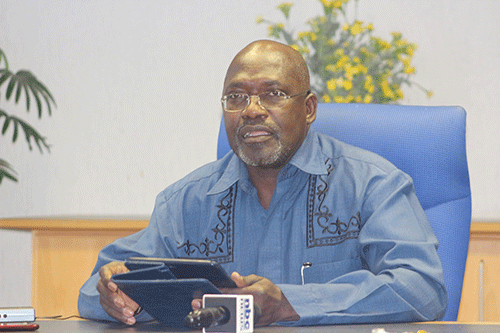Senior officials of the environment ministry came under fire yesterday when they appeared before a Parliamentary Standing Committee on Legal Affairs for allegedly having failed to properly consult over the Bwabwata National Park tourism development and benefits with the communities living in and surrounding the game reserve.
This comes after the parliamentary committee undertook a visit last month to Kavango East region to engage and collect facts on the Bwabwata issue causing disunity between the Hambukushu and Khwe (San) communities over ancestral land in the park.
This crisis led to the Hambukushu traditional authority petitioning lawmakers to revisit a Cabinet decision taken in 1999, prohibiting communities in the Bwabwata National Park area from owning cattle. As part of the committee findings, Kletus Karondo, who is the chairperson of the committee, said the Hambukushu community expressed that after the proclamation of Bwabwata to a national park status, the remaining land to be used for small-scale farming units has become very small.
“The Cabinet decision or directive of 1999 that no cattle be allowed in the Bwabwata National Park did not provide them with any other alternative where to graze their cattle. The Hambukushu maintains that Bwabwata is their ancestral land,” Karondo said.
Equally, he said, the multiple-use area of community-based tourism and trophy hunting, human settlement and development only benefit the Khwe people.
Similarly, the Khwe community that lives in Bwabwata also presented their petition with claims of “oppressive practices” perpetrated against them when it comes to their rights as Namibians. Part of the claims is dispossession and disregard of land and land rights of the Khwe by government and fellow Namibians, as well as loss of access to land rights, refusal to recognise the Khwe traditional authority and growing inequality and poverty.
The parliamentary committee last week invited the environment officials to a public hearing to respond to the issues raised by the community.
The hearing proceeded yesterday where members of parliament demanded documentation proof over the proclamation of Bwabwata and all correspondences that took place between government officials and the affected communities.
The environment officials provided piles of documentation outlining high profile correspondences including that of former President Hifikepunye Pohamba backdating as far as 2013. One such communication from Pohamba was his directive to put on hold the launch of Bwabwata as a park until proper consultation has been done with all affected communities and also to find a lasting solution to the long-standing issue.
Standing committee member and Cabinet member Tjekero Tweya blamed the ministry for failing to consult communities as per directives of Pohamba and current President Hage Geingob on the issue. “Pohamba in 2013 wrote to Charles Namoloh, then minister of regional and local government pertaining to the issue of Hambukushu and concerns about turning Bwabwata into a park.
He asked the minister to attend to the long-standing issue for a long-lasting solution. “It is a long-standing issue but nothing happened. If we don’t consult and impose decisions, that is a disaster. President Hage Geingob yesterday [during the SONA] said that consultation is key to peace,” Tweya lamented. Equally, Tweya charged another failure was when Hambukushu Fumu Edwin Mbambo wrote to environment and tourism minister Pohamba Shifeta but they failed to meet for a dialogue on the Bwabwata park management and its benefits.
In defence, environment ministry deputy executive director Colgar Sikopo said several consultations have been taking place way before the 1999 Cabinet decision between traditional authorities, government officials, tourism stakeholders, conservancies and affected communities.
He added consultations were fruitful as hunting concessions were awarded by government to communities in those conservancies residing in and near the park. “There were several consultations before the Cabinet decision. There are no direct benefits going to the Hambukushu but MET made provision for them to benefit just like other communities who are benefiting from parks through concessions,” Sikopo noted.
He also said some communities such as Mayuni, Mashi and the Khwe through the Kyaramacan Association were consulted. The Bwabwata issue over ancestral land is not the only case in point. Others include the Haikum communities in Etosha National Park who are also claiming land rights.
Environment ministry executive director Teofilus Nghitila warned: “If you allow people to reclaim or unproclaim Bwabwata, then you are opening doors or precedence to others to claim ancestral land rights in other parks. This will become a challenge for the ministry and government.” The committee is also set to meet other stakeholders such as the ministry of agriculture on the same issue. – anakale@nepc.com.na



